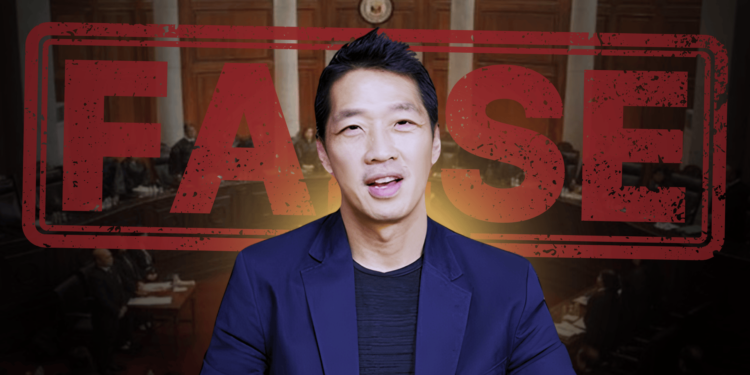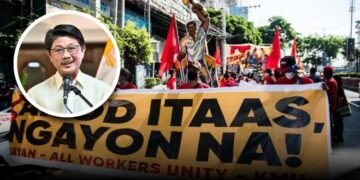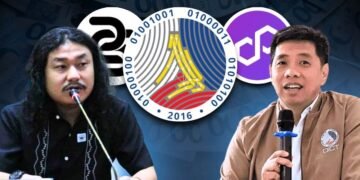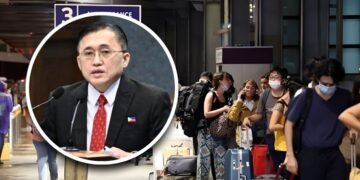Youtuber Chris Tan is treading on dangerous legal ground with remarks that echo the kind of rhetoric that has previously drawn the Supreme Court’s attention in indirect contempt cases. Similar claims — questioning the Court’s independence by tying it to the number of former president Rody Duterte appointees and accusing it of cowering to power — have already led to legal consequences for Richard Heydarian and Rep. Percival Cendaña, and a public apology from no less than former senator and now congresswoman Leila de Lima. The Court has made clear that casting baseless doubt on its integrity is a line that, once crossed, carries real consequences.
In an interview with Bilyonaryo, host and anchor Atty. Karen Jimeno asked Tan to react to the PDAF scandal and the fact that several people accused of plunder were eventually acquitted.
Tan replied that “justice is only for the rich and powerful” and claimed that ordinary Filipinos do not have the same access to the justice system. He then transitioned to the issue of Duterte and the judiciary during his term. “There was no co-equal branch of government during the Duterte time. Everyone was cowering to his authoritarian power,” Tan said. “That’s why Duterte always wanted to have the trials done here. I want to be tried by the Filipino. I want to be tried by the justice system. Oh, by the way, I appointed all 12 of the existing justices. The 12 are his.”
Duterte has publicly and repeatedly stated that he prefers to face any legal proceedings in the Philippines rather than before the International Criminal Court in relation to the ICC’s investigation into alleged crimes against humanity connected to the government’s anti-drug campaign from July 2016 to March 2019. This position was not made in a vacuum.
Under Article 17 of the Rome Statute, the ICC may only exercise jurisdiction when a state is unable or unwilling to investigate and prosecute genuinely. Duterte’s legal team invoked this complementarity principle to assert that Philippine courts have primary jurisdiction over any alleged offenses because the acts occurred within the country and involved Filipino nationals.
This argument was formally communicated to the ICC, and the Philippine government maintained that domestic mechanisms were available to investigate and prosecute. Duterte’s public statement therefore had legal backing and was consistent with the country’s obligations under the Rome Statute at the time.
Tan, however, painted this legally grounded position as a product of Duterte’s influence over the Supreme Court, suggesting that his preference to be tried in the Philippines is linked to the fact that he appointed twelve of the fifteen sitting justices.
Duterte appointed these twelve justices as vacancies opened up during his term due to mandatory retirements and resignations. Under the Constitution, the President is required to appoint justices from a shortlist prepared by the Judicial and Bar Council.
The number of appointments resulted from the natural schedule of vacancies during his term, not from any deliberate effort to change the Court’s composition or expand presidential influence and control the Court.
The justices appointed by Duterte were Alexander Gesmundo, Rodolfo Zalameda, Samuel Gaerlan, Henri Jean Paul Inting, Mario Lopez, Edgardo Delos Santos, Amy Lazaro-Javier, Jhosep Lopez, Ricardo Rosario, Japar Dimaampao, Maria Filomena Singh, and Jose Midas Marquez.
While these justices were already sitting, several major Supreme Court decisions ran directly counter to the Duterte administration’s positions. These rulings involved some of the most politically charged issues of his presidency, and each one showed that the Court exercised independence despite the President having appointed the majority of its members.
The first major blow came in 2018 with Proclamation 572, when the Duterte administration attempted to revoke the amnesty granted to former senator Antonio Trillanes IV over his involvement in the Oakwood and Manila Peninsula uprisings.
Malacañang insisted that Trillanes failed to comply with application requirements and sought his immediate arrest. The Supreme Court rejected this claim and ruled that an amnesty granted with congressional concurrence cannot be unilaterally withdrawn by the President.
The decision effectively blocked an order Duterte had publicly defended and turned it into one of his most high-profile legal defeats.
A few years later, the administration suffered another setback over the Anti-Terrorism Act of 2020, a measure it had championed as essential to national security. The law expanded the executive’s powers to define and act on terrorism, prompting a flood of petitions questioning its constitutionality.
In December 2021, the Supreme Court struck down key portions of the law, including parts of Section 4 and Section 25. The ruling sharply narrowed the government’s counterterrorism powers and drew a firm line between security measures and constitutional rights, underscoring the Court’s willingness to limit executive authority.
Judicial independence was also tested in the drug war records case, which centered on petitions to compel the release of police documents related to anti-drug operations. The Duterte administration resisted disclosure, invoking national security and operational concerns.
The Supreme Court ordered the release of thousands of police records, a decision that cut through government objections and asserted the Court’s role in ensuring transparency in matters involving potential rights violations.
The Court also defied the administration’s position in the Maria Ressa bail and travel case, which gained international attention. Government lawyers opposed Ressa’s request to travel abroad while her cyber libel conviction was under appeal.
The Court granted her motion, allowing her to post bail and leave the country. This ruling reinforced the judiciary’s independence in cases involving press freedom and political scrutiny.
Tan’s remark that justice is “only for the rich and powerful,” made as part of his broader mockery of Duterte’s public position that any case against him should be tried in the Philippines, ignores the clear record of an active and functioning justice system, including during Duterte’s presidency.
Even at the height of the drug war, the courts continued to operate independently and hand down convictions, including in cases that directly implicated police officers. One of the most widely covered cases involved the killing of 17-year-old Kian delos Santos in 2017, where the Caloocan City Regional Trial Court in 2018 found three police officers guilty of murder and sentenced them to reclusion perpetua.
In 2022, two Caloocan policemen were also convicted for the killing of Carl Angelo Arnaiz and Reynaldo “Kulot” de Guzman, marking another decisive ruling against state agents. Several other cases have been prosecuted at various levels of the judiciary, demonstrating that accountability mechanisms were working — imperfectly, but undeniably in motion.
Tan’s claim that “nakita naman natin sa panahon ni Duterte how the judicial system was all—there was no co-equal branch of government during the Duterte time. Everyone was cowering to his authoritarian power” is rooted more in Tan’s bias than in fact.
Contrary to this claim, Duterte did not publicly defy or interfere with Supreme Court rulings during his presidency. There was no recorded instance of him undermining the Court’s authority or refusing to implement its decisions, even in cases that went against his administration’s positions.
He sometimes expressed frustration over legal delays and the slow pace of the judicial process, but he consistently abided by the rulings of the Court. Unlike his rhetoric toward institutions such as the Commission on Human Rights, the United Nations, the ICC, and opposition figures, Duterte did not launch a sustained public campaign questioning the Supreme Court’s legitimacy.
In fact, compared to several past presidents, Duterte’s stance toward the judiciary was notably restrained. During the Marcos Sr. regime, the executive openly ignored and overrode judicial orders, particularly during Martial Law, when the Court often faced pressure to legitimize authoritarian measures. Gloria Macapagal-Arroyo had several direct confrontations with the Court, including in the Neri v. Senate case and during the controversies involving her appointments near the end of her term, which triggered institutional tension.
Benigno Aquino III also publicly criticized the Supreme Court after its decision striking down the Disbursement Acceleration Program (DAP), leading to a very public rift between Malacañang and the judiciary.
Duterte, by contrast, neither attempted to override the Court nor discredit its decisions. He did not use his platform to attack the Court’s legitimacy or rally his base against it.
No executive action was taken to undermine judicial authority, and there were no constitutional crises or institutional standoffs between Malacañang and the Supreme Court during his term.
This absence of defiance is verifiable in the public record and stands in stark contrast to Chris Tan’s insinuation that Duterte controlled the judiciary or used his appointments to shield himself from accountability.
The illusion of an “untouchable Duterte” stems less from actual control over the judiciary than from the absence of drug war or human rights abuse cases filed against him in local courts during and after his presidency.
This absence is not the result of presidential interference with the justice system, but of legal limits during his term and evidentiary constraints after it. Under Philippine law, a sitting president is immune from suit.
This principle was first recognized in Soliven v. Makasiar (1988) and reaffirmed in Estrada v. Desierto (2001) and Estrada v. Arroyo (2001). It bars the filing of criminal or administrative cases against a president while in office to ensure the unimpeded performance of official duties.
Even during his presidency, earlier attempts to file cases against Duterte did not prosper because of these legal limits. The Ombudsman dismissed the multiple murder and crimes-against-humanity complaint filed by Edgar Matobato in 2017 for lack of jurisdiction.
A plunder complaint filed by Senator Antonio Trillanes was also dismissed after the Anti-Money Laundering Council confirmed that the alleged bank accounts did not exist. Lawyer Jude Sabio, who had filed a communication before the ICC alleging crimes against humanity, later withdrew his complaint, saying the case had become politicized.
These were filed in venues such as the Office of the Ombudsman and the ICC, but no local court assumed jurisdiction over any criminal case against Duterte while he was president. This is consistent with established legal doctrine, not proof of compromised judiciary.
Once Duterte stepped down in 2022, that immunity was automatically lifted. Some cases were eventually filed in local venues, but none were related to the drug war or human rights abuses. These included the grave threats complaint filed by Representative France Castro over Duterte’s televised remarks and the inciting to sedition complaint filed by the CIDG after his comments about “killing senators.” Both were dismissed by prosecutors — the first for lack of probable cause, the second on grounds of constitutionally protected political speech.
Yet, despite the ICC probe and the intense political criticism surrounding the drug war, no human rights or drug war–related case has been filed against Duterte in Philippine courts. This is not because of judicial capture, but because prosecutors have repeatedly cited the lack of direct evidence linking him personally to police operations that resulted in killings.
Both the Commission on Human Rights and the Department of Justice noted this in their reviews of drug war cases. The CHR said in its June 2022 report that it “did not find any records or documents that could establish a direct chain of command responsibility to then President Rodrigo Duterte.” The DOJ, meanwhile, stated that its review found “no evidence directly linking higher officials to these incidents,” focusing instead on the operational accountability of police officers involved.
These outcomes highlight that cases can and have been filed against Duterte, but their fate depended on jurisdiction, evidence, and legal standards — not judicial subservience.
The absence of drug war cases against Duterte in particular reflects the difficulty of establishing direct legal responsibility, not the existence of an untouchable figure controlling the courts. This was not the first time Chris Tan cast doubt on the Supreme Court’s integrity.
Even before the ruling on the Sara Duterte impeachment complaint on July 23 this year, he was already telling his followers that “something strange is happening” and claiming that the Court was “trying to find a loophole” to invalidate the impeachment. He reminded them that “12 of the SC justices are Duterte appointees” and urged them to “stay vigilant,” linking it to what he called “the clear and present danger of the Dutertes.”
On July 23, still before the ruling, Tan warned that if the Court struck down the impeachment, it would “effectively deny the people transparency and accountability” and “open the floodgates for unabated corruption.”
Four days later, after the Supreme Court unanimously dismissed the complaint, he accused the justices of “stretching certain interpretations” and making the issue “so complex and overwhelming that majority of people will just surrender to this.” He also claimed this was a “dangerous reinterpretation” of the Constitution meant “to protect the powerful.”
In a YouTube video released shortly after, Tan went further, accusing the judiciary of twisting the law. The video title read “How the Supreme Court Sabotaged the Constitution” and its caption claimed the judiciary had “misinterpreted the Constitution to the point of making unconstitutional amendments to its core principles of due process.”
Tan’s damaging statements went largely unnoticed, but the same cannot be said about Heydarian, Rep. Cendaña, and Rep. De Lima, who made similar claims and immediately drew the attention of the Supreme Court.
Richard Heydarian posted on X, “FACT: DUTERTE had APPOINTED as many as 13 out of 15 SUPREME COURT justices by 2022!! No wonder the SC is now the Supreme Coddler.” Cendaña, meanwhile, declared, “The Supreme Court has reduced itself to being the Supreme Coddler of Vice President Sara Duterte.” De Lima described the ruling as “one-sided” and characterized it as “ex parte.” These are the same types of claims Tan makes, sweeping, emotionally charged, and untethered to the actual record of the Court’s decisions.
The Supreme Court responded firmly, warning that reckless public attacks erode trust in the judiciary. Indirect contempt proceedings were initiated against Heydarian and Cendaña. De Lima later issued a statement of apology, saying, “I regret and most humbly apologize to the Supreme Court for characterizing the impeachment decision as ex parte,” and clarified that she respects the Court’s decision.
Heydarian, in his legal filing, tried to temper his statement by noting, “the decision was unanimous and it would be unfair to automatically cast judgment just because of appointment patterns.” Cendaña, meanwhile, publicly stood by his remark.
The facts stand in sharp contrast to their claims. One of the clearest indicators of the Court’s independence is the vote of Associate Justice Marvic Leonen, a 2012 appointee of Benigno Aquino III and one of the most vocal critics of Duterte’s policies.
Leonen joined the majority in dismissing the impeachment complaint. If the Court were truly acting under Duterte’s influence, Leonen would have been the least likely to side with the justices Duterte appointed. His concurrence dismantles the claim of political capture and underscores that the decision was anchored on constitutional principles, not personal or political loyalties.
Chris Tan was lucky that even though his statements are arguably more sweeping than those of Heydarian, Cendaña, or De Lima — because they do not merely question a specific ruling but attack the entire judiciary’s independence during an entire administration and beyond — he was not relevant enough to catch the attention of the Supreme Court when it took action against those who made similar claims.
But to arrogantly continue insisting on selling the idea that the Court is beholden to Duterte is a dangerous move. It flirts with indirect contempt and feeds division by casting doubt on an institution that has repeatedly shown it can act independently of any president.












